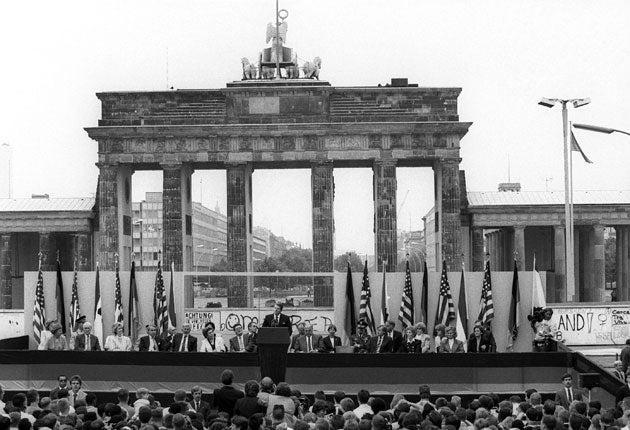East Germans watch transfixed as their country falls apart
Countdown to the fall of the wall: By late October 1989, the East German regime was imploding. Demonstrations and an exodus across the Czech border forced hardliners from office, state censorship to be cast aside, and an air of panic to grip the leadership...

25 October 1989
East Germany's new leader, Egon Krenz, says plans approved by the Politburo to allow every East German to travel abroad will be put into action as soon as possible. But he says there are problems, among them the foreign currency cost. East German leaders have calculated that if people were allowed to take out only 500 marks (£170) each it could absorb over half the country's foreign currency reserves.
26 October 1989
From 7.30 each evening, millions of East Germans sit riveted to their television screens. The attraction is not some Western spectacular but their own evening news programme, Aktuelle Kamera. For decades, it has been churning out a mind-numbing diet of production figures, visits by dreary apparatchiks from other Eastern bloc countries, and Communist propaganda. Now, camera teams are out filming demonstrations, reporters thrust microphones in front of party leaders, workers and students are seen grumbling freely about everything wrong with the country.
And, for the first time, East Germans are avidly reading their own press. Newspapers sell out by mid-morning. Pages are filled with interviews or readers' letters. The new freedom has caught East German journalists untrained and unprepared. An older journalist from the official news agency, AND, said: "Reporters have to think for themselves, they have to get out of the office and talk to people. Many are not used to it."
27 October 1989
East Germany announces an amnesty for everyone convicted of escaping or trying to escape to the West, and for causing a disturbance during demonstrations. The Interior Ministry later adds that from 1 November it was lifting a ban on visa-free travel to Czechoslovakia.
2 November 1989
More than 50,000 East Germans took to the streets today to demand democratic reforms, and the official news agency spoke of a "social crisis". The removal of discredited hardline officials has begun with the sacking of the wife of the former leader, Erich Honecker, and the resignations of four other senior politicians. Sixty thousand East Germans have left via Hungary, Poland and Czechoslovakia.
5 November 1989
The government introduces new laws on travel which will enable all citizens to receive passports and to travel to the West for up to 30 days a year. At the same time, in Leipzig, scene of ever-expanding weekly demonstrations, the city's Communist Party leader, Horst Schumann, resigns.
6 November 1989
The biggest crowds yet seen in Leipzig, Dresden and other East German cities tonight marched through the streets demanding free elections and an end to Communist domination. In Leipzig, half a million people brave are driving rain in the biggest-ever demonstration in this grimy industrial city. Hundreds of thousands more are on the streets for the first time in Dresden, another 60,000 are marching in Halle. There are also 50,000 protesting in Karl-Marx-Stadt, and 25,000 are on the streets in Schwerin.
8 November 1989
The East German government yields to pressure from the vast demonstrations and the rapid haemorrhage of its young people, and resigns to make way for change. East Germans are pouring across the Czechoslovak border at the rate of around 9,000 a day, or an average of 375 an hour. An estimated 30,000 have come since Czechoslovakia opened its border last Friday. In Bonn, officials estimate that if travel restrictions for East Germans are really eased, 1.2 to 1.4 million will come to the West to stay.
Join our commenting forum
Join thought-provoking conversations, follow other Independent readers and see their replies
Comments